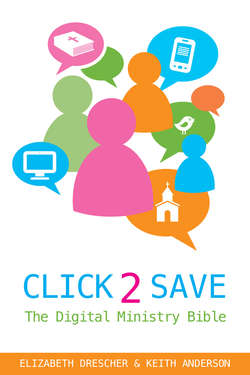Читать книгу Click 2 Save - Keith Anderson - Страница 20
На сайте Литреса книга снята с продажи.
CROWDSOURCING CHRISTIANITY
ОглавлениеNow, this could mean that we engage social media defensively—finding ways to ferret out negative perceptions of our leaders, denominations, churches, and other organizations. Indeed, a cottage industry of sorts has grown up around this kind of “reputation management,” serving mainly corporations, politicians, and celebrities by searching for and attempting to erase negative comments, reviews, images, and the like. But this isn’t the only way, nor, we would argue, the best way, to engage the new, digitally widened world. We see digitally connected global networks as profound opportunities to reverse Christian parochialism and colonialism by enabling us to more fully enter into conversation, relationship, and common action that doesn’t override the gifts of one culture with those of another, but which gathers the best of all of us into the Christian project of kingdom-making.
CROWDSOURCING
Crowdsourcing, the idea of outsourcing to an unknown group of responders, is the practice of using social networking to draw upon the expertise and/or resources of people distributed across the globe to solve a problem or address an issue.
JAMES ROLLINS Director of Marketing and Communications, United Methodist Committee on Relief
The challenge of sharing information on the United Methodist Committee on Relief’s and Methodist Global Ministry’s efforts on behalf of the church is not a small one. Neither is encouraging people to support projects that address the spread of malaria in Africa, the creation of community health programs in the Philippines, or the engagement of youth and young adults in service projects in their communities and across the globe.
Rising to such challenges is all in a day’s work for James Rollins, who sees social media not merely as a faster, less expensive conduit for messages to the faithful. He sees social networks like Facebook, which serves as a hub for a variety of online UMCOR ministries, as centers of engagement and participation within and across communities.
The UMCOR “10-Fold” project, for instance, is an online event that begins on October 10 each year (10–10). For ten days, ten projects around the world are highlighted through webcasts, streaming video, and online chats that put people in local church communities in conversation with people in communities where Global Ministries and UMCOR projects are unfolding.
“This is way more than a fund-raising or even an awareness-raising effort,” explains Rollins. “The 10-Fold project is an experience. It allows everyone in the church to have the actual experience of seeing and listening to the people we serve. It absolutely creates a global community for the ministries we do.”
Though 10-Fold has a separate website (10-fold.org), Rollins stresses that the success of the 10-Fold project, which was recognized by the Religion Communicators Council as “Best of Class” in 2010, is very much dependent on a robust Facebook network. “Facebook is the starting point for much of our communication,” says Rollins, “because that’s where people already are. It amplifies and, in a way maybe, bypasses traditional church communications. We are able to be in touch with people whether or not they happened to be in church on Sunday. And, it also starts a conversation that people will take into our churches on Sunday.”
Rollins notes that the remarkably interactive 40,000 members of the UMCOR Facebook page are not just gathering information on and discussing UMCOR-sponsored projects. They’re also sharing their own service. So, for example, you’ll see a request for a local campaign to educate people on human trafficking on All Saints Day to be extended across the wider Methodist Church community. You’ll find discussions of what sorts of snacks to put in backpacks for low-income kids who might not have enough food over the weekend. Folks share photos of bags for relief supplies and instructions on how to sew them. And, of course, there’s lots of prayer, praise, and thanksgiving.
“What’s important here,” says Rollins, “is that all of this media belongs to everyone. We’re all creating it and sharing it together.”
In a sense, as James Rollins describes the social media ministry of the United Methodist Church, this makes every church a global relief agency, every congregant an active agent of God’s love and compassion in the wider world. This work is no longer the narrow purview of church-sponsored NGOs, who collect money from churches to distribute around the globe on behalf of believers.
In the digital world, this gathering of globally distributed participants in loosely organized communities is called “crowdsourcing,” a practice that ignores the traditional boundaries of geography, status, gender, race, class, and so on to draw on the practical wisdom of everyone with an interest in helping to solve a problem, disseminate ideas, or collaborate on projects related to shared interests. Crowdsourcing is now used to support the microfinancing of small businesses around the globe whose owners would never qualify for traditional financing (as through the microlending sites Kiva and MicroPlace). But it’s more often not so focused and goal-directed. When you participate in social media networks like Face- book, Twitter, LinkedIn, and the like as someone who is open and articulate about her or his faith, you are, in effect, crowdsourcing Christianity, crowd-sourcing the church. You are extending the love of Christ both within and beyond the boundaries of your local community and, more than that, inviting others to share their faith and their lives with you and your community. Whether or not this translates into more “pledging units,” you are vastly expanding the reach of the faith in the world.
